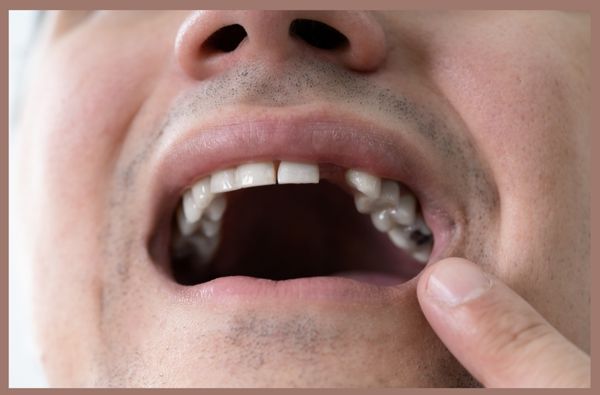Top Dentist Debunk Common Myths About Tooth Decay and Gum Disease
If You Suffer From Gum and Teeth Pain, New Research Reveals The Real Reason These Problems Keep Recurring and Real Remedies That Help
According to the Centers for Disease Control and Prevention, half of adults age 30 and older suffer from some form of gum disease. Gum disease is an infection of the tissues that surround and support your teeth, caused by plaque, the sticky film of bacteria that is constantly forming on our teeth. Plaque that is not removed with daily brushing and flossing between teeth can eventually harden into tartar.
This (among other things) leads to gum disease. While gum disease is a serious issue, there are many myths about tooth decay and oral problems.
Top dentists weigh in on debunking the common myths regarding gum disease and tooth erosion.
#1 Gum Disease Only Affects Your Oral Health

Advanced gum disease can cause you to lose teeth, but it also increases your risk of getting heart disease, some cancers, stroke, diabetes, Alzheimer’s disease, and other types of dementia. Pregnancy complications like preterm birth and low birth weight can also happen if you have advanced gum disease.
Gum disease may also be linked to other health problems such as heart and respiratory diseases, preterm, low birth weight babies, stroke, osteoporosis, and diabetes.
#2 If You Don’t Have Cavities, You Don’t Have Gum Disease

Cavities and gum disease are not the same thing. The kind of bacteria that gives you cavities (*Streptococcus mutans*) is different from the kind that causes gum disease (*Porphyromonas gingivalis*). Even if your teeth have never had cavities, they can still become loose and fall out if the gum around them and the bone underneath are damaged by advanced gum disease.
#3 If You Brush Your Teeth Regularly, You Won’t Get Gum Disease

While brushing and flossing your teeth is important for preventing gum disease, sometimes it’s not enough. As gum disease gets worse, the spaces between teeth (pockets) get deeper. Once they’re deeper than 4mm, you can’t clean them with a toothbrush and floss. This is when you need professional help.
Your genes, smoking, and diabetes also make it more likely for you to get gum disease, even if you brush and floss your teeth well.
#4 Gum Disease Is Not That Serious

If you have gingivitis, it means that your gums are inflamed. This is the first stage of gum disease and can be fixed with the right treatment and a good daily oral care routine. But, if you don’t treat gingivitis, it can turn into a more serious gum disease called periodontitis. Periodontitis is irreversible, which means it can’t be fixed and may eventually result in tooth loss.
The tissue in your mouth is the same as the skin on your arm from your wrist to your elbow. If that area was red, swollen, and infected, you would go to the doctor. Gum disease is not a small infection and it can cause you to lose teeth. This can change your appearance, breath, and ability to chew food.
#5 Cavities Are The Number One Cause Of Tooth Loss

Gum disease is the number-one cause of tooth loss. This means that more people lose their teeth because of gum disease than any other reason. Gum disease is also a more vital oral health concern than tooth decay. This means that it is more important to pay attention to your gum health than your tooth health.
#6 Gum Disease Can Be Treated With Antibiotics

Research shows that antibiotics can help treat gum disease. However, medical and dental communities are worried about people using too many antibiotics to treat infections. This could create new, antibiotic-resistant strains of bacteria. This would be bad for patients if they got a life-threatening illness that antibiotics couldn’t help.
#7 Tooth Loss Is A Natural Part Of Growing Older

If you take care of your teeth and see a dentist regularly, your teeth should last your whole life. But if you don’t take care of your teeth, gum disease can make you lose them. Gum disease is the main reason adults 35 and older lose their teeth.
#8 Bleeding Gums Are Normal

If your gums bleed when you brush your teeth, it could be a sign of gum disease. Other signs of gum disease are red, swollen, or tender gums; sores in your mouth; gums that have pulled away from teeth; bad breath; pus between teeth and gums; loose or separating teeth; and a change in how your teeth fit together.
#9 Poor Oral Hygiene Is The Only Cause Of Gum Disease

If you don’t brush and floss your teeth regularly, you’re more likely to get gum disease. But even if you brush and floss well, you can still get gum disease. That’s because there are other things that can cause it, like genetics, smoking, pregnancy, and diabetes.
#10 Gum Disease Treatment Is Painful

Local anesthesia, sedation, and over-the-counter medications have made patients’ treatment experiences more pleasant and comfortable. Many patients find they are able to return to their normal routines the same day or by the next day.
#11 Gum Disease Is Irreversible

Gum disease is a problem that can happen to your gums. It is reversible in its earliest stage, which is called gingivitis. This means that if you catch it early enough, you can get rid of it before it gets worse. If you have gingivitis, it is important to brush your teeth well and to see the dentist for cleanings. This will usually get rid of the gingivitis and prevent the gum disease from getting worse.
#12 If You Have No Symptoms, You Do Not Need To Treat Your Mouth

Gum disease is common, and many people don’t know they have it because the early symptoms are subtle and painless. Look out for early warning signs, such as bleeding gums and sensitivity, to prevent gum disease from getting worse.
#13 Receding Gums Will Grow Back

Gum recession can be unsightly, affecting the gum line and causing the appearance of longer teeth. But it can also cause more serious problems for your oral health. Once gums have receded, they will not regrow on their own. However, there are treatments available to cover exposed tooth roots, restore the gum line, improve your smile, and safeguard your oral health.
Although there are ways to treat receding gums, it is best to try to prevent them in the first place. This can be done by taking care of your teeth and gums every day.

